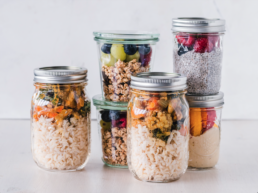By Shavon LeBlanc, First Mile Care DPP Coach
Exercise is a critical component of the CDC-proven National Diabetes Prevention Program (DPP). At First Mile Care, we encourage DPP participants to set a minimum goal of at least 150 minutes of physical activity each week to keep strong and fit.
If weight loss is part of your goal to become healthy, exercise is essential, along with eating a healthy diet. Studies have shown the benefit of resistance training three or more days a week in lowering the risk of chronic illnesses such as type 2 diabetes. Just as important, cardiovascular exercise three to five days per week strengthens your heart, stimulates the immune system, contributes to weight loss, and provides a mental health boost.
First Mile Care Coach Kathy Gregory previously shared her tips for preparing for your workout — getting the right types and amounts of fuel, hydration, and sleep. But your post-workout routine is equally important.
Keep stretching
Making movement a daily priority is essential to good health. It is important to vary the intensity of exercises to develop strength gradually and incrementally, whether exercising alone at home or with a coach in a gym. Consistency will lead to change in body composition and strength. After your workout, I recommend lower-intensity activities involving flexibility, stretching, mindfulness, and meditation to reduce the risk of injury and improve the recovery process.
Before and after your workout, stretching prepares your muscles to exercise and assists in releasing post-workout tension. Static stretching — holding a stretch for at least 30 seconds — lengthens muscles and increases muscular relaxation. For a deeper stretch, contract the opposing muscle that you are stretching. For example, if stretching your quadriceps (the front of your leg), engage, contract, and squeeze your hamstrings (the back of your leg) for a deeper stretch. When stretching, avoid bouncing, and do not stretch to the point of pain.
I recommend stretching at least 10-20 minutes post-workout, as well as days in between heavy workouts, as a method of recovery. Rest and recovery are important tools in building strength, preventing injuries, and improving performance between days of resistance training and cardiovascular exercise. For example, after a heavy lifting day, the next day’s activities should be at a lower intensity, involving light cardio and/or flexibility exercises.
Maintaining hydration
Water is essential before, during, and after a workout — especially if you’re exercising in hot and humid climates. Dehydration can limit your recovery and performance. Water should be your hydration replenishment of choice for short exercise routines. When exercising at a higher intensity or longer than one hour, electrolyte-filled drinks can provide carbohydrates and water to replace glycogen stores. Protein shakes can also serve for nutrition supplementation after resistance training.
During an intense workout session longer than 60 minutes, you should immediately rehydrate with 1 cup (8 oz) of fluid. Then drink 4-6 cups of water continuously for the next 1-2 hours after your workout.
My suggestion is to avoid consuming alcoholic beverages prior to exercise. Alcohol leads to dehydration and lowers blood flow to the muscles. If you decide to drink, wait 1-2 hours after your workout. Calorie intake management is important when working toward health goals, so indulge in alcohol beverages sparingly if weight loss is important to you.
Replenishing energy
Food is fuel, so after-exercise replenishment is important to recovery. The type of exercise will determine the fuel you choose for your post-workout replenishment. Carbohydrates serve as the energy source for vigorous exercise, contracting muscle and providing fuel to your brain. Carbohydrates are processed within the body to be converted to glucose, the primary energy source for many body processes. Glycogen stores carbohydrates in the muscle and liver so that they can be accessed to provide energy to muscles during prolonged exercise.
Low-intensity exercises like gardening, light walking, and tai chi are replenished with easy-to-digest carbohydrates and water. Moderate-intensity exercise like bicycle-riding, aqua aerobics, and tennis games should be replenished with carbohydrates and protein. High-intensity workouts or resistance training need protein as fuel to build lean muscle and improve performance.
As soon as possible after exercise, you should begin refueling to rebuild and replenish muscle. Within the first 30 minutes after exercising, consume easy-to-digest carbohydrates in fruits and vegetables, electrolyte replacement beverages, or protein shakes. Consuming protein and carbohydrates together improves recovery time and increases glycogen stores. Supplement your carbohydrate intake with 15-25 grams of protein to assist in muscle growth and protein synthesis.
If you’re exercising to lose weight, fill your plate with vegetables and fruits that are lower in calorie content and higher in fiber and nutrients. Your post-workout meals should include lean protein, complex carbohydrates, and a small amount of healthy fat. Some yummy and healthy snack examples include scrambled eggs with sauteed spinach, ground turkey and avocado, apples with peanut butter and granola, protein shakes or protein bars, yogurt with granola and fruit, or wheat toast with avocado, egg, and salsa.
Today’s media-heavy environment floods us with advertisements that build cravings for delicious processed foods. Avoid heavily processed snack foods and unhealthy drive-through options, as they do not benefit post-workout refueling. Fried foods, salty chips, and sweet sodas provide simple carbohydrates but not the nutritional support to satisfy your hunger, which leads to overconsumption and does not assist in the rebuilding of lean muscle.
Prioritizing sleep
Quality sleep is an essential component of a post-workout regimen, as a healthy sleep and recovery pattern leads to greater mental and physical performance. Tissue repair, muscle strength, stimulation of the immune system, and production of growth hormones occur during sleep and are essential to rebuilding a strong body. From a type 2 diabetes prevention perspective, lack of sleep can lead to higher blood glucose levels as it impairs the activity of insulin.
Set a sleep routine to get your body in a rhythm to promote healthier sleep. An hour before bedtime, refrain from exercising, using your mobile phone, and consuming caffeine, which prevent restful sleep. You should also avoid alcohol before bedtime due to its dehydrating effects. And of course, choose a quiet and dark sleeping environment that is comfortable and conducive to rest.
Building change
Building strength and working out is important to your well-being and in preventing type 2 diabetes. Developing a good post-workout regimen will help you maximize your fitness.
At First Mile Care, we advocate steady, incremental lifestyle change to prevent diabetes. By taking the time to prepare your body for exercise and to allow it to wind down from a workout, your muscles can recover, rebuild, and strengthen. You’ll reduce the risk of injury while following your goal to sustainable change.
To learn more about how you can benefit from the First Mile Care Diabetes Prevention Program, take the prediabetes risk test and get started today!



